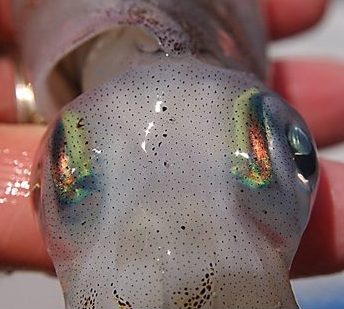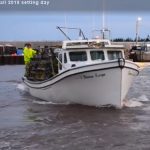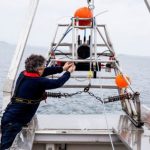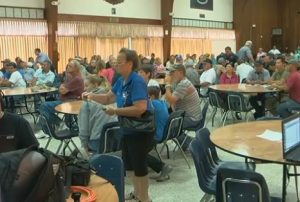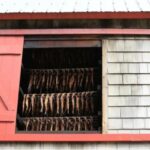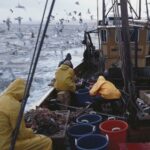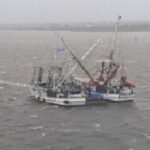Daily Archives: February 23, 2017
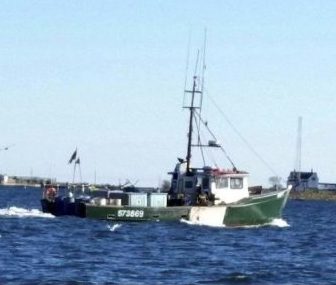
Bad hull, flooding led to fatal sinking of Orin C
The deadly sinking of the Gloucester-ported Orin C nearly 15 months ago probably was caused by structural problems with the vessel’s wooden hull and subsequent flooding, according to reports from the National Transportation Safety Board and Coast Guard released Thursday. The two reports detailed the marine tragedy that resulted in the drowning of 47-year-old Capt. David C. “Heavy D” Sutherland during the final stages of the Coast Guard’s rescue that saved crewmembers Rick Palmer and Travis Lane on the night of Dec. 3, 2015. Neither Palmer nor Lane could be reached Thursday for comment. The Coast Guard report did not recommend any changes to its training, rescue procedures or the equipping of its rescue vessels. That, however, does not mean it won’t make changes in the future, according to District 1 Deputy Commander Brad Kelly. “That is something the Coast Guard is always looking at in trying to determine what should be included into all of our rescue platforms,” Kelly said. “That is an ongoing process.” Continue reading the article here 21:01
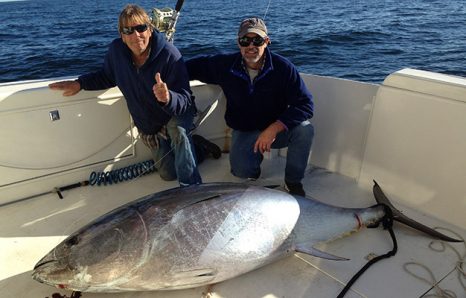
A veteran commercial fisherman’s invite to fish for giants came along and I wasted no time in accepting.
Catching a giant bluefin with rod and reel has been on my bucket list for a long time. I grew up on the water and spent several summers as part of a crew that fished with handline or harpoon. My life’s path led me away from the ocean, and for years I’d wanted to go back and do it again with more sporting tackle. Decades passed without an opportunity and my desire was relegated to the back burner until a recent series of events rekindled the flame. Several more years passed as I tried unsuccessfully to mooch my way onto a boat until I eventually connected with fellow Mainer, Don Fletcher. A veteran commercial fisherman, Don switched over to tuna fishing after he acquired an Ocean Yachts 55 SS he named the Blue Bandit. When the invitation came to join him, I wasted no time in accepting. Continue reading the story here 16:52
Hawaii bill would ban licenses for some foreign fishermen
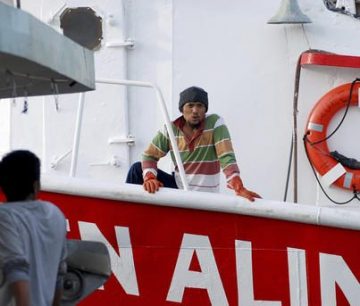 A bill in the Hawaii Legislature aims to change rules for how fishing licenses are issued to foreign crew members that make up the majority of the state’s commercial fleet. Now, boat owners or captains bring foreign crew members’ passports and customs documents to a state agency to get their licenses – without the fishermen present. A federal legal loophole allows foreign fishermen to work off the coast of Hawaii, but they are technically not allowed to enter the country. The bill would require anyone seeking a commercial fishing license in Hawaii to appear in person. State Sen. Karl Rhoads says he wants to change the law so people who are not permitted to enter the U.S. cannot get a license to fish on American-flagged boats sailing from Honolulu. The Hawaii Longline Association opposed the bill, saying the industry is already regulated and additional requirements are unnecessary. Read the story here 16:00
A bill in the Hawaii Legislature aims to change rules for how fishing licenses are issued to foreign crew members that make up the majority of the state’s commercial fleet. Now, boat owners or captains bring foreign crew members’ passports and customs documents to a state agency to get their licenses – without the fishermen present. A federal legal loophole allows foreign fishermen to work off the coast of Hawaii, but they are technically not allowed to enter the country. The bill would require anyone seeking a commercial fishing license in Hawaii to appear in person. State Sen. Karl Rhoads says he wants to change the law so people who are not permitted to enter the U.S. cannot get a license to fish on American-flagged boats sailing from Honolulu. The Hawaii Longline Association opposed the bill, saying the industry is already regulated and additional requirements are unnecessary. Read the story here 16:00
Fishermen at odds over impact of Trump executive order
 An executive order by President Donald Trump designed to radically cut back on federal regulations has spurred disagreement among fishermen about how it will affect them — and lawmakers and regulators aren’t sure what the answer is. Groups that represent both commercial and recreational fishermen are divided over whether Trump’s “one in, two out” approach to federal regulations will benefit their industry, harm it or not affect it at all.,, Several fishing groups, ranging from the Alaska Longline Fishermen’s Association to the Massachusetts Striped Bass Association, are joining Democratic Reps. Jared Huffman of California and Raul Grijalva of Arizona in asking Trump to rescind.,, Other industry interests, including the Fisheries Survival Fund, said the order will likely leave fisheries unaffected. The order would apply only to financially significant regulations, and that would not include things like opening fishing seasons and enforcing catch limits, said Drew Minkiewicz, an attorney for the fund. “All this talk about how you’re not going to be able to manage fisheries — not true, doesn’t apply, not going to happen,” he said. Read the full story here 15:04
An executive order by President Donald Trump designed to radically cut back on federal regulations has spurred disagreement among fishermen about how it will affect them — and lawmakers and regulators aren’t sure what the answer is. Groups that represent both commercial and recreational fishermen are divided over whether Trump’s “one in, two out” approach to federal regulations will benefit their industry, harm it or not affect it at all.,, Several fishing groups, ranging from the Alaska Longline Fishermen’s Association to the Massachusetts Striped Bass Association, are joining Democratic Reps. Jared Huffman of California and Raul Grijalva of Arizona in asking Trump to rescind.,, Other industry interests, including the Fisheries Survival Fund, said the order will likely leave fisheries unaffected. The order would apply only to financially significant regulations, and that would not include things like opening fishing seasons and enforcing catch limits, said Drew Minkiewicz, an attorney for the fund. “All this talk about how you’re not going to be able to manage fisheries — not true, doesn’t apply, not going to happen,” he said. Read the full story here 15:04
NOAA/NMFS Declines to List Thorny Skate as Threatened or Endangered
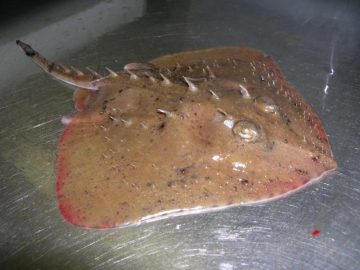 In response to a petition from Defenders of Wildlife and Animal Welfare Institute to list thorny skate (Amblyraja radiata) under the Endangered Species Act, we have now determined that listing is not warranted at this time. The May 2015 petition requested that we list a “Northwest Atlantic Distinct Population Segment” or a “United States Distinct Population Segment” of thorny skate as threatened or endangered. Thorny skate are at low abundance in U.S. waters compared to historical levels, primarily due to overfishing. However, declines have been halted throughout most of the species’ full range, and the species remains abundant throughout the North Atlantic, with hundreds of millions of individuals in the Northwest Atlantic alone. Read the rest here 12:21
In response to a petition from Defenders of Wildlife and Animal Welfare Institute to list thorny skate (Amblyraja radiata) under the Endangered Species Act, we have now determined that listing is not warranted at this time. The May 2015 petition requested that we list a “Northwest Atlantic Distinct Population Segment” or a “United States Distinct Population Segment” of thorny skate as threatened or endangered. Thorny skate are at low abundance in U.S. waters compared to historical levels, primarily due to overfishing. However, declines have been halted throughout most of the species’ full range, and the species remains abundant throughout the North Atlantic, with hundreds of millions of individuals in the Northwest Atlantic alone. Read the rest here 12:21
Maryland’s veteran crab manager fired after watermen complain to Hogan
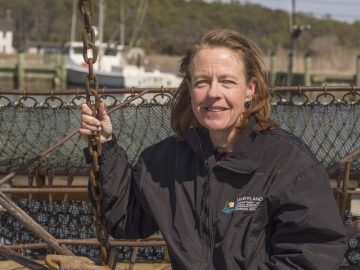 Maryland’s veteran manager of the state’s blue crab fishery was fired this week after a group of watermen complained to Gov. Larry Hogan about a catch regulation that they contend hurts their livelihood — but that scientists say is needed to ensure a sustainable harvest. Brenda Davis, crab program manager for the Department of Natural Resources and a 28-year state employee, said she was informed Tuesday that her services were no longer needed. In an interview Wednesday, Davis said Fisheries Director Dave Blazer gave no reason for her summary dismissal. But it came after Hogan met last week with about a dozen Dorchester County watermen who had been pressing Davis and the DNR for a change in a long-time regulation setting the minimum catchable size for crabs. Continue reading the story here 11:46
Maryland’s veteran manager of the state’s blue crab fishery was fired this week after a group of watermen complained to Gov. Larry Hogan about a catch regulation that they contend hurts their livelihood — but that scientists say is needed to ensure a sustainable harvest. Brenda Davis, crab program manager for the Department of Natural Resources and a 28-year state employee, said she was informed Tuesday that her services were no longer needed. In an interview Wednesday, Davis said Fisheries Director Dave Blazer gave no reason for her summary dismissal. But it came after Hogan met last week with about a dozen Dorchester County watermen who had been pressing Davis and the DNR for a change in a long-time regulation setting the minimum catchable size for crabs. Continue reading the story here 11:46
PETA takes credit for Linda Beans exit from the lobster industry
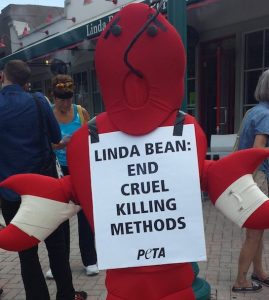 A PETA investigation showed workers at Linda Bean’s Maine Lobster slaughterhouse ripping fully conscious crabs and lobsters apart. After CBS released the footage, it wasn’t long before social media influencers did the same thing to Linda Bean. Faced with the negative attention, canceled business contracts, PETA protests, and a barrage of nearly 76,000 e-mails from our members, Bean began quietly slipping out the back door of the lobster shanty, as reported by The Boston Globe. Read the rest here, and by all means, Order Your FREE Vegan Starter Kit! 11:00
A PETA investigation showed workers at Linda Bean’s Maine Lobster slaughterhouse ripping fully conscious crabs and lobsters apart. After CBS released the footage, it wasn’t long before social media influencers did the same thing to Linda Bean. Faced with the negative attention, canceled business contracts, PETA protests, and a barrage of nearly 76,000 e-mails from our members, Bean began quietly slipping out the back door of the lobster shanty, as reported by The Boston Globe. Read the rest here, and by all means, Order Your FREE Vegan Starter Kit! 11:00
Cook Inlet Alaska Board of Fisheries meeting to kick off with new faces, old grudges
 The Alaska Board of Fisheries has a full plate for its triennial Upper Cook Inlet finfish meeting beginning Feb. 23 and running through March 3 in Anchorage. The board will look quite different with three new members since the last meeting and so does the fishery after three years of restriction, tight markets, lawsuits, and accusations of disregarding the best science that revolve around the board decisions at its last Upper Cook Inlet meeting in 2014. Chinook, or king, salmon stocks on the Kenai River and around the state started to plummet in the late 2000s, and in 2014, the Board of Fisheries approved paired restrictions directing the Alaska Department of Fish and Game had to take certain actions when the Kenai king fishery was restricted, including limiting commercial fishing time. Sport representatives generally thought it fair to share the burden of conservation, while commercial fishermen said it hit them harder than the sportfishermen. This year, nearly 200 proposals from commercial, sport and subsistence fishermen will try to overhaul entire fishery management plans, revise escapement goals, expand or contract fishing areas and openings hours, add or remove new gear types and in general try to open up more fishing opportunity for each respective group. Continue reading the article here 08:54
The Alaska Board of Fisheries has a full plate for its triennial Upper Cook Inlet finfish meeting beginning Feb. 23 and running through March 3 in Anchorage. The board will look quite different with three new members since the last meeting and so does the fishery after three years of restriction, tight markets, lawsuits, and accusations of disregarding the best science that revolve around the board decisions at its last Upper Cook Inlet meeting in 2014. Chinook, or king, salmon stocks on the Kenai River and around the state started to plummet in the late 2000s, and in 2014, the Board of Fisheries approved paired restrictions directing the Alaska Department of Fish and Game had to take certain actions when the Kenai king fishery was restricted, including limiting commercial fishing time. Sport representatives generally thought it fair to share the burden of conservation, while commercial fishermen said it hit them harder than the sportfishermen. This year, nearly 200 proposals from commercial, sport and subsistence fishermen will try to overhaul entire fishery management plans, revise escapement goals, expand or contract fishing areas and openings hours, add or remove new gear types and in general try to open up more fishing opportunity for each respective group. Continue reading the article here 08:54
Sebastian Inlet District to crack down on angry anglers defecating and spreading it on the rail to mark their territory
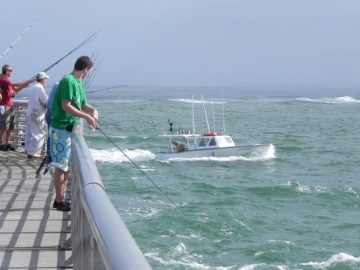 At Sebastian Inlet fishing pier, lines often cross. And tangled tackle ticks off fishermen so much, they often revert to territorial tactics, casting aspersions and sometimes other things at their angling adversaries, inlet officials and fishermen say. They hurl lead fishing weights, lures and other objects at folks fishing from boats. Or sometimes boaters are the primary aggressors. Signs and video cameras haven’t tempered things much. Inlet officials say that in the past few years, the pier atmosphere has degraded into a state of constant territorial marking, as things just keep hitting the fan — and sometimes even the concrete pier and its cylindrical metal rails. “We’ve had reports of people defecating and spreading it on the rail to mark their territory so nobody will fish next to them,” said Martin Smithson, administrator for the Sebastian Inlet District. “There have been several citations for public urination.” Read the story here 08:14
At Sebastian Inlet fishing pier, lines often cross. And tangled tackle ticks off fishermen so much, they often revert to territorial tactics, casting aspersions and sometimes other things at their angling adversaries, inlet officials and fishermen say. They hurl lead fishing weights, lures and other objects at folks fishing from boats. Or sometimes boaters are the primary aggressors. Signs and video cameras haven’t tempered things much. Inlet officials say that in the past few years, the pier atmosphere has degraded into a state of constant territorial marking, as things just keep hitting the fan — and sometimes even the concrete pier and its cylindrical metal rails. “We’ve had reports of people defecating and spreading it on the rail to mark their territory so nobody will fish next to them,” said Martin Smithson, administrator for the Sebastian Inlet District. “There have been several citations for public urination.” Read the story here 08:14






 FOR IMMEDIATE RELEASE
FOR IMMEDIATE RELEASE 